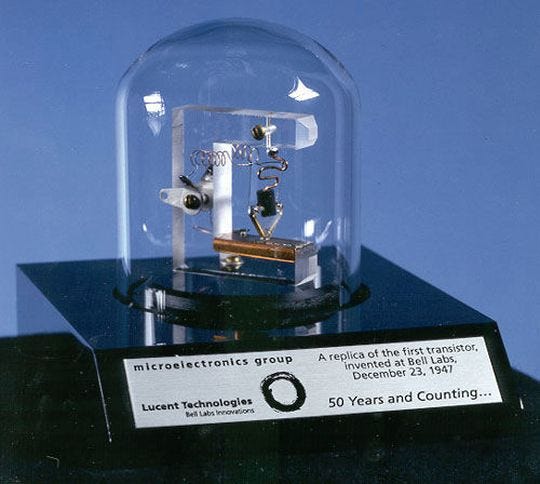Analytical Target Fixation
A short interlude while I get some ducks in a row...
I’m hard at work on my next essay, which has been meandering indeed and needs to be brought back in line, so while taking a break to regroup, I had a chat with my older brother during which he reminded me of a story he heard back when he was in college in the early 70s.
One of his courses was taught by a distinguished engineer who’d worked for decades in the electronics industry. This gentleman related the experience of a colleague who was researching transistors in the early days after their invention in 1947.
The first transistors were basically three wires and a rock (actually a chunk of germanium), and as nobody was quite sure what they were good for at first, they were the subject of intense study. This particular researcher (my brother’s instructor’s colleague) was being frustrated in his work: the transistor he was experimenting with kept giving him odd and unpredictable results. After much diligent analysis, he finally figuring out why: it was reacting to light.
Relieved he’d figured out the problem, he promptly went out and asked his secretary if she had any nail polish. She did, and when she graciously handed it over, he took it back to his lab where he carefully painted over the transistor’s “rock.” The device behaved perfectly thereafter and – having solved the problem – he was well satisfied.
Except… what this diligent colleague of my brother’s instructor had actually done was discover the photoelectric effect.1 But in his singular focus to solve the “problem” that was plaguing him, he ignored what that “problem” might have told him, and probably cheated himself out of world renown and a Nobel prize. Someone else would go on this gather those laurels.2
The moral of the story: The data are always trying to tell us things, but if we become too fixated the problem we’re investigating, we can stop listening as well as we might.3 As Louis Pasteur said “Chance favors the prepared mind.”4

Whereby a semiconductor produces electric current when exposed to light – the foundational principle behind solar panels, digital imagery, etc.
My brother says that while his instructor attributed this incident to a “colleague,” he (my brother) had a vague suspicion, given the manner in which it was related, the account may have been autobiographical.
The reverse is also true: if we chase after every possible implication of every bit of data, we’ll fail to get anything done. So focus = good; tunnel vision = not good. No one every accused me a of tunnel vision; getting things done is another matter… 😉
My ancient Bartlett’s quotes the original slightly differently. As usual, time and public consumption have re-rendered it in a pithier form.


